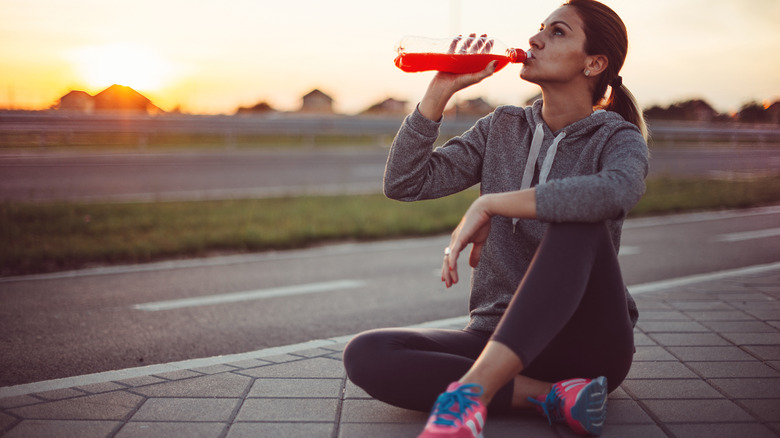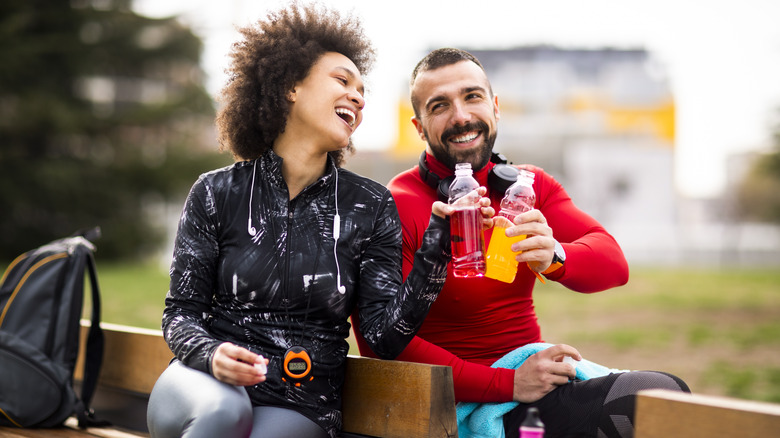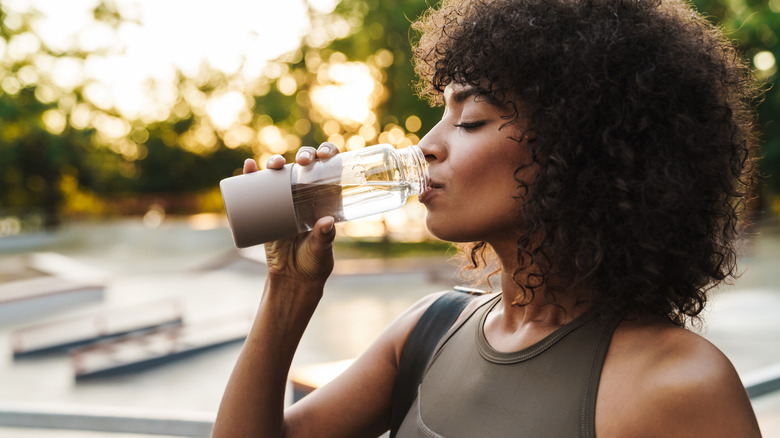Why Sports Drinks Might Not Be As Hydrating As We Thought
Whether you reach for a Gatorade, Liquid Death, Powerade, or All Sport, sports drinks are appealing because of their bright hues and sweet/salty taste. While commercials may portray them as absolute necessities for serious athletes, even non-athletes might regularly buy a bottle or two in place of water, just to hydrate themselves.
But have you ever stopped to consider if sports drinks actually hydrate your body? The answer might be a little nuanced depending on what kind of sports drink you pick up at the store. Sports drinks fall into three broad categories based on their concentration of ingredients when compared to our blood — hypertonic, isotonic, and hypotonic. Most sports drinks contain water, carbohydrates (sugar), and electrolytes (sodium, potassium, and chloride). Hypertonic sports drinks contain a higher concentration of carbohydrates and electrolytes (and lower concentration of water) than our blood, while hypotonics contain a lower concentration of carbohydrates and electrolytes and a higher concentration of water than our blood. Isotonics contain more or less the same concentration of carbohydrates and electrolytes as our blood.
What does this mean for hydration? As it turns out, hypertonic sports drinks can actually cause dehydration in the short run because of their high carbohydrate content. As explained by sport and exercise nutritionist, James LeBaigue on YouTube, "[With hypertonics] water first has to move from your bloodstream into your gut to dilute that solution [high concentration of carbohydrates] and balance things out. And technically in the short term, this dehydrates you." Hypertonics basically take longer to get absorbed into your bloodstream.
Hypotonics might be the best for hydrating yourself
A 2022 study published in Sports Medicine assessing the hydrating effects of hypertonic, isotonic, and hypotonic sports drinks actually found that hypotonics are the best drink for hydration out of the three. Because of their higher concentration of water, they're the fastest to be absorbed into your bloodstream. According to nutrition, metabolism, and exercise professor at Massey University and lead author of the study, Dr. David Rowlands, hypotonics even "outperformed the heavily marketed isotonic sports drinks" (via Verywell Health).
Choosing what kind of sports drink you should be drinking also depends on your exercise and hydration goals. As explained by the director of the Human Performance Laboratory at James Madison University in Harrisonburg, Virginia, Dr. Mike Saunders to Everyday Health, "The primary reasons to consume sports drinks during exercise are to provide fluids and electrolytes to prevent dehydration, and to provide carbohydrates to maintain fuel availability to the muscles during prolonged exercise."
Since hypertonics have a higher percentage of carbohydrates, they might be great for those times when you need energy (and you're not really focusing on hydrating). With hypotonics, you may not get the energy benefit, but you will definitely be replenishing fluids in your system. What about electrolytes then? What do they do? Electrolytes in sports drinks do the important job of retaining fluid in our system and also replacing the sodium we lose when we sweat a lot.
Where does water stand in comparison to sports drinks?
If you're only thinking about hydrating yourself (minus the extra calories in sports drinks), drinking plain water will get the job done. But for those performing strenuous exercises or leading active lifestyles, sports drinks can help do other things for your body.
Again, it all depends on what kind of exercise you're doing, how much electrolytes your body needs, and how much energy you're looking for. If you're simply looking for a drink after a 30-minute walk, skip the sports drinks and stick with water, but if you're doing long-distance running in cool weather or looking for some energy before a particularly grueling and long workout and you're not particularly focused on hydration, hypertonic sports drinks might be your best bet. If you're exercising for short periods of time (an hour or less), exercising in particularly hot conditions, or simply looking for an alternative drink to water (because let's face it, sports drinks do taste better), hypotonics could be a good choice for you. As for isotonics, you can have them before a relatively short workout if you really want to.
Whether or not sports drinks actually help you exercise depends on how much energy you need for the workout and how much electrolytes you'll need to be replaced after a workout. Hydrating with your recommended intake of water daily is important (15.5 cups for men and 11.5 cups for women). But for those who don't like drinking water, isotonics or hypotonics might be good additions to your life, especially if their taste makes you take in more fluids than you're currently getting.



